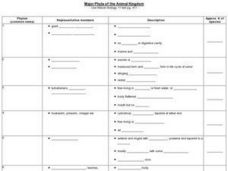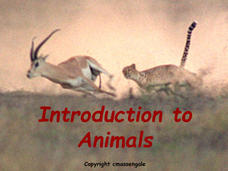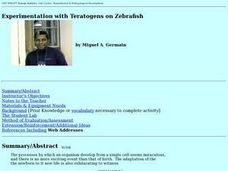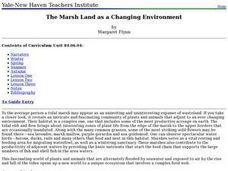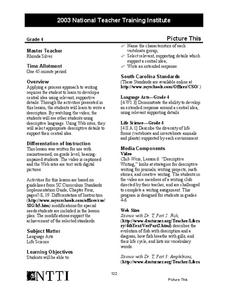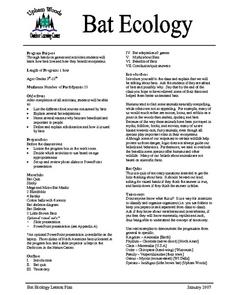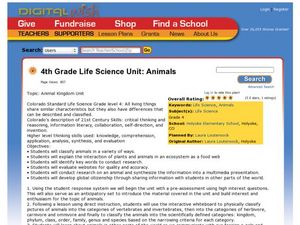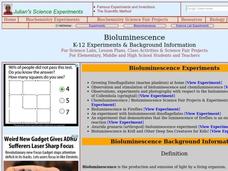Curated OER
Biodiversity
In this biodiversity learning exercise, students sort and classify animals by their observable features using a dichotomous key. Students then respond to questions about complete and incomplete metamorphosis.
Curated OER
Oceanography: Ocean Market
Sstudents identify consumer goods obtained from the oceans. They classify the items and calculate the cost of buying these goods. After taking a simulated sea shopping spree, they tally the cost of the items purchased. They conclude the...
Curated OER
Major Phyla of the Animal Kingdom
In this animal kingdom worksheet, students compare and contrast the 10 different phyla including the description and approximate number of species found in each one. This worksheet is a graphic organizer.
American Museum of Natural History
The Tree of Life
Groups of species can have more in common than meets the eye. An interactive cladogram shows some of the connections between important groups of species. Learners click on sections of the diagram to learn more about the connections or on...
Biology Junction
Introduction to Animals
Out of all animals, elephants alone lack the ability to jump. Scholars learn all about animals using a presentation full of fun examples. It describes different types of animals, the biological similarities and differences between...
Virginia Department of Education
Animal Phyla and Plant Divisions
Searched hours for an activity that allows individuals the ability to use multiple resources to learn about both plant and animal kingdoms? This discussion and activity provide pupils with the ability to visualize each organism before...
American Museum of Natural History
Finding Fossils
How does one go about finding fossils? Find out with an informative webpage that looks at the digging process, showcases rocks and common fossils, helpful tips, and a list of archeological do's and don'ts.
Curated OER
Experimentation with Teratogens on Zebrafish
Students compare mitosis and meiosis with regard to chromosome number in parent cells versus daughter cells, types of cells produced, total number of cells produced, and the number of divisions. In groups, identify and differentiate the...
Curated OER
Nervous System
In this nervous system worksheet, students identify and locate each of the vocabulary terms related to the nervous system in the word search. There are 15 biology terms to locate in the puzzle.
Curated OER
The Marsh Land as a Changing Environment
Sixth graders continue their examination of the state of Connecticut. After taking a field trip, they identify the types of birds, plants, invertebrates and vertebrates who make their home in the salt marshes. In groups, they identify...
Curated OER
Missing Macroinvertebrates
Students investigate the concept of a macroinvertebrate. They observe the presence of increases or decreases in population in order to test for factors that contribute to the extinction of a species. Students predict the likelihood of...
Curated OER
Diversity of Life
Students explore the diversity of life forms and the role that interdependency plays in our world through a mult-segmented unit. This segment introduces the unit.
Curated OER
Ocean Creature Classification
Pupils develop a Taxonomic Key for marine invertebrates from pictures they are given after practicing together with common objects, such as shoes. They then compare their key to a provided Ocean Invertebrates Taxonomic Key.
Curated OER
Woodland Math Facts
In this Woodland math facts learning exercise, students study and examine woodland weights of trees and shrubs, explore invertebrates and draw a bar chart to chart their findings.
Curated OER
Classification of an Echinoderm
Students study starfish through dissection. In this biology lesson plan, students explore the lives of starfish as they view a slide show, observe parts of echinoderms, and compare the classification of the starfish with other...
Curated OER
Write a Description
Finding the central idea is the focus of this lesson. Middle schoolers write descriptions of different animals using details and descriptive language. They watch a video of kids using descriptive language, and then use showing language...
NOAA
Individual Species in the Deep Sea
A tube worm's outer covering is made of chitin, the same material that makes up the shells of lobsters and crabs. Scholars create tube worms and analyze and discuss the longevity of organisms living near cold seeps. They then discuss and...
Curated OER
Week 8 - Sea Life
Using a magnifier, mini marine biologists examine the barbules of a bird feather. They swirl the it into a mixture of oil and water and then re-examine the feather. After the activity, discuss how the oily feathers pose a problem to sea...
Curated OER
The Wonderful World of Slugs
Examine a slug? Of course, what else would a 2nd grader do with it? Pupils use clues and go on a slug hunt, read a slug story, or make a cooperative group mural of a slug's habitat. While older learners catalog slugs, go on a slug hunt,...
Curated OER
Arthropod Coloring Worksheet
In this biology learning exercise, learners color and label the different parts of arthropods. They complete 63 short answer and fill in the blank questions on arthropods.
Curated OER
Creating a Classification System
Students create classification system for Arctic-dwelling animals, the Arctic hare in particular.
Curated OER
Bat Ecology
Students, through hands on games and activities, discover how bats live and how bats benefit ecosystems. They play a game designed to show them how echolocation works and another to show how mother bats locate their young through their...
Curated OER
4th Grade Life Science Unit: Animals
Fourth graders classify animals. In this animal kingdom lesson, 4th graders research animal habitats and behaviors. Students connect to a zoologist via SKYPE and learn about animal classification. Students blog about preserving animal...
Curated OER
Bioluminescence
Students differentiate chemiluminescence from bioluminescence. In this biology lesson, students explain how fireflies and other animals emit light. They discuss the applications of engineered bioluminescence.




